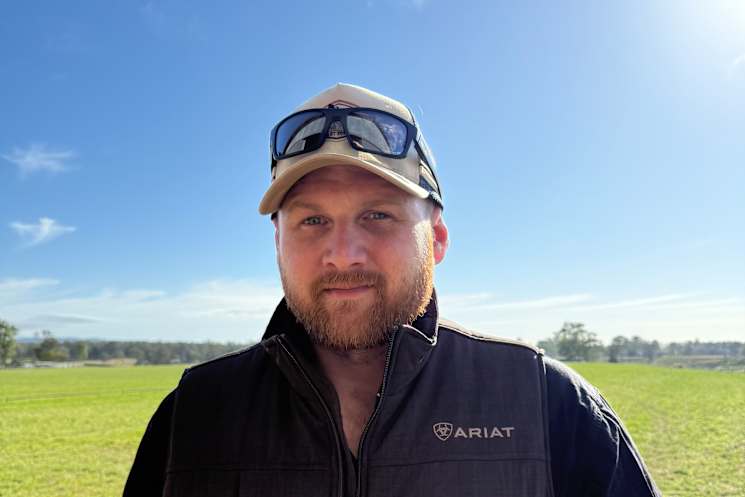
Lockyer Valley hay agent Jake Holzheimer
LOCKYER Valley hay agent Jake Holzheimer has spent more than two years pleading for a farmer-led solution to restore market access for Queensland fodder – only to watch government inaction devastate livelihoods.
Mr Holzheimer estimated that Queensland hay producers had collectively lost millions of dollars under restrictions tied to the National Fire Ant Eradication Program (NFAEP). For him personally, the losses have been catastrophic: $700,000 vanished from his business alone, a result he has dubbed “theft by red tape”.
He said his solution remained clear and evidence-based: a fodder accreditation scheme where producers certify hay via a vendor declaration form, backed by audits and best-practice storage standards. Certified fodder could move freely across borders indefinitely unless rules are deliberately breached.
“It’s simple, free to use, and it works,” Mr Holzheimer said.
“But for two years, the government has done nothing. Emails go unanswered. Consultations are staged, then dropped. That’s not governance – that’s stonewalling.”
Premier David Crisafulli defended his government’s record on fire ants, blaming Labor for “bungling” the eradication program and touting new spending and 100 extra biosecurity officers.
A spokesman for Mr Crisafulli told the Tribune the government was “working with industry to address their concerns and delivering bolstered biosecurity measures to protect Queensland’s agriculture, tourism and communities”.
Lockyer Valley MP Jim McDonald insisted he had been advocating for farmers, arranging delegations with the Minister for Primary Industries Tony Perrett and departmental staff to discuss market access.
Mr McDonald said there “had [been] several delegations of producers of cultivated lucerne products meet with relevant government staff. The department and minister’s office are fully informed".
“I will continue my advocacy for our producers to the Minister and the department, as I have done by arranging these delegations and with ongoing discussion regarding improving market access,” he told the Tribune.
Mr Holzheimer said of the scores of farmers with whom he had liaised, all said they had never been visited by their local Member, Federal Member for Wright Scott Bucholz or departmental representatives about the plan.
He also dismissed advice from Mr McDonald – such as hosing down lucerne before baling – saying it would ruin fodder rather than protect it.
“Come to our farms. See the 24-year clean record. Stop hiding behind spin and press releases,” Mr Holzheimer said.
“Implement the accreditation scheme. Petition NSW to lift its unjust bans. Hold NFAEP accountable for its 880,000-hectare disaster zone. Otherwise, you’re complicit in destroying this industry.”
Mr Holzheimer said no fire ant outbreak had ever been traced to professionally produced fodder.
The restrictions remain, New South Wales continues to block Queensland hay, and Mr Holzheimer said producers were losing up to half their markets.
A 2024 Senate inquiry into the NFAEP found treatment delays, mismanaged budgets, and millions of dollars left unspent even as infestations spread.
Meanwhile, a Greenlife Industry conference at Berrinba will stage an exclusive, members-only “Industry Forum: A New Dialogue in the Fight Against Fire Ants” with the NFAEP this weekend.
“It highlights the gulf between inclusive industry engagement and NFAEP’s closed-door approach,” Mr Holzheimer said.
“This is a slap in the face. While farmers watch their livelihoods vanish, NFAEP holds private forums. Why is there no consultation with farmers running commercial operations?”
Mr Holzheimer said the goal remained to focus on constructive solutions.
“Our industry isn’t the high-risk vector they claim,” he said.
“We have proven systems. The question is whether the government will finally listen before more damage is done.”
Mr Perrett declined to comment.
Key Facts:
· 880,000 hectares currently infested by fire ants in Queensland.
· No outbreaks traced to hay in 24 years.
· Producers losing up to 50 percent of markets due to restrictions.



